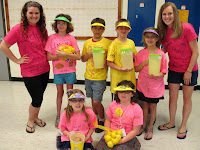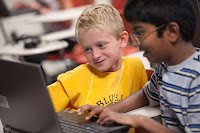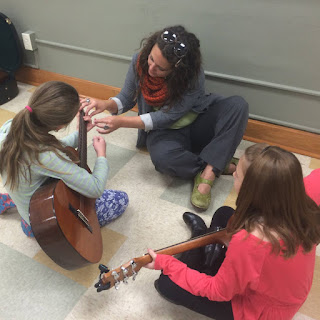Sunday, April 30, 2017
Saturday, April 29, 2017
I Refuse to Let Go of This Very Old Anchor!
Nick Haigis
Nick Haigis
Project-based learning works for those willing to try it out. But there were those (me) that didn’t want to ruin what looked to be a good thing. So please hear me out as I explain how a (slightly) stubborn teacher came around on the idea of trying the project-based approach with his advanced students. Or, skip to the how-to’s at the end if you’re here for the list everyone looking at blogs seeks out 😉
I am so tired of every person who has two cents in education telling me, “This needs to change, this needs to change, change this now, how can we change this to….” While I know it’s not meant to be an insult on my wonderful creation of a PowerPoint lesson or a lab I designed from nearly nothing, it still begs the question, “Can I at least try it out for a couple rounds to see how it goes?!?” I suppose the answer to that is yes, if you’re willing to be open about alterations down the road, which I did with the idea that I wouldn’t change too much going forward as I stuck by the notion, “If it ain’t broke, don’t fix it.” This worked, for several years in my early teaching, but became exhausting. Too many times I ended the day being beat from all the questions, comments both contributing and not, as well as dealing with classroom management. It all weighs on you very much.
That is starting to change now, as much as I hate change. So very much. Very, very much…
But it is for the better as I’m growing to find. My ninth-grade advanced integrated science students were getting lessons meant for maybe a more “regular” level class, but I was happy as the majority were doing well on tests, and we were having meaningful discussions. Still, I suppose part of me thought they could achieve more.
The online resource, ERIC, provides a bevy of primary journals that you can peruse to see the benefits of utilizing project-based units, especially with their emphasis on nurturing gifted young minds. I offer some direct links at the end of this blog to some of the more notable ones I have found regarding research backing up the novel concept of collaboration.
After working with another of my colleagues, we started to see the benefit of utilizing more project-based units into our curriculum. In fact, I spearheaded the first such idea for an entire unit of ours centralized on a common theme. I suggest you check it out, nothing gets a good portion of today’s youth on board with a concept when you can relate it to a popular gaming franchise, even simply used as a starting point.
I have even been open to changing items on this project-based unit on feedback from the previous year’s use of it. It has meant all the world as the background knowledge of nuclear radiation is stronger for freshmen as they head into chemistry in the next two years at our school. They also get to work through the entire planning process of designing a solution to a real-world problem that could still happen today as much as you may not want to think about it. Perhaps most importantly, I get to become the, “guide on the side,” and less, “the sage on the stage.” The heavy lifting is more on their shoulders, but they also have fun customizing their own shelter before they build a 3D model version of it to be analyzed over by me during the presentations!
This is a terrific way to also incorporate some students that may feel awkward working with others. Maybe you have a class with some students twice-identified that may be unbelievably knowledgeable on concepts, but always want to work by themselves because they don’t get along with others. These projects afford the opportunity to work on your own research, become an “expert,” then bring that knowledge (and confidence) to the table as you work with the other experts to make a strong product together. This article really supports this concept to open your students to working with different-abled students.
I have already started working on my next project-based unit in my Planet Earth lessons on geology. Namely, working on trying to find the best material and structural stability of a three-story building as it undergoes a massive shake testing in class!
My best advice I can give on trying this out in your class is the following:
- Perseverance on your end is huge. You will be extra exhausted possibly thinking of every facet of your new unit to roll out. For that reason, take a summer off from any profession development you may thinking about (or “voluntold” to go to, if possible). I know this seems counter-intuitive, but be fully invested without anything hanging over your head.
- Pick one (and only one) to try out first; you need a template to run on. The next unit you tackle will be so much easier now that you have a foundation for what a successful unit can look like.
- Reflect on the success (or failure, as it happens). You don’t have to fill out anything or turn a document in to your central office to justify someone’s job. Just reflect on if the process worked for you (and the students)!
- In science, really target a few performance expectations in the NGSS. Don’t fall into a trap of making a cool project with a weak learning target. Otherwise, kids will remember how much fun they had doing the project, but really have no idea what they were supposed to learn.
- Proofread any documents you make (Like, at least three times), or you subject yourself to being a walking meme as students point our your every small grammatical mistake. Lesson learned, 6th Period AP Environmental Science students…
Really try this process out and you can thank me later when you have 😊
These resources can help get the ideas for your own project going:
- HaigisHelp
- Your Starting Point: NGSS
- The Effectiveness of Project-Based Learning on Pupils with Learning Difficulties Regarding Academic Performance, Group Work and Motivation
- Investigation the Scientific Creativity of Gifted Students through Project-Based Activities
- Computer Assisted Project-Based Instruction: The Effects on Science Achievement, Computer Achievement and Portfolio Assessment
Monday, April 17, 2017
Summer 2017 Camp Innovation Program -- June 12-16 at Northern Kentucky University
Great news! We are excited to announce our summer 2017 Camp Innovation Program classes held at Northern Kentucky University. Camp Innovation will be held, Monday-Friday, June 12 - 16, 8:30-11:30 am. Students are able to select 2 classes from 40 different selections! The first courses will meet from 8:30-10:00 and the second 10:00-11:30. Students will be escorted between classes by program personnel. The full program brochure is available here: Summer 2017 Camp Innovation Program Brochure.
Northern Kentucky University’s Camp Innovation Pathways to College Program is a trailblazing program designed for high potential youth to discover and explore advanced content and engaged learning. All classes provide the opportunity for students to share interests with other children while exploring pathways to intellectual development, academic enhancement, career exploration, and creative artistic fulfillment. Camp Innovation offers transdisciplinary courses infusing entrepreneurship, science, mathematics, social studies, technology, visual and performing arts, and original interdisciplinary studies. We encourage students to choose their own classes on a first-come first-served basis.
What makes NKU's Camp Innovation Program Leading-Edge?
- Student-centered focus on career exploration pathways and college-readiness
- Emphasis on critical and creative thinking though independent learning
- Environment that values creativity, diversity, entrepreneurship, and achievement
- Challenging hands-on, transdisciplinary learning
- Personal attention from dedicated teachers trained through graduate coursework in gifted education
- Small class sizes for caring, personalized, and differentiated instruction
- The opportunity to share interests with other high potential children

- Registration opens Monday, April 24, online http://inside.nku.edu/gifted or via phone 859-572-5600.
- For the best choice of classes, register early! Students are placed in classes on a first-come, first-served basis and many classes will fill before the June 5 application deadline.
- Course grade levels are recommended levels. For example, if you child is advancing from third grade into fourth grade in the fall, she can select courses from either the Builders (K-3) or the Innovators courses (3-6),
- Class materials fees are paid directly to the individual teachers on the first day of class.
- A limited number of need-based financial aid scholarships are available.
 Afternoon Care:
Afternoon Care:- Afternoon care is available through NKU's Early Childhood Center's summer program from 11:30 am - 6:00 pm. Contact Lindsey Shaffer, Summer Camp Coordinator, 859-572-6338 or ecc@nku.edu for details and registration.
Questions and Additional Information:
- Please contact Dr. Kimberly Code at gifted@nku.edu or Community Connections at 859-572-5600 for questions and further information.
NKU's Camp Innovation Pathways to College Program is endorsed by the
Northern Kentucky Association for Gifted Education.
Labels:
Board Games,
CampInnovation,
Chess,
GiftedMinds,
GrowthMindset,
Mathematics,
Medicine,
Minecraft,
Paleontology,
ParentPlace,
STEM,
TalentDevelopment,
Technology
Location:
Louie B Nunn Dr, Newport, KY 41099, USA
Friday, April 14, 2017
Personalize Your Experience with the NKU Institution for Talent Development and Gifted Studies
The NKU Institute for Talent Development and Gifted Studies is dedicated to developing collaborative, meaningful partnerships with businesses, community agencies, and educational institutions in support of high potential and gifted youth.
In today’s world where information is coming to you from all angles--text messages, emails, Facebook, etc.--personalized, relevant information is more important than ever, and is also harder to find.
Our Institution recognizes this, and we are taking an innovative step to save you time when communicating news and content.
In order to provide more meaningful, useful and timely information, the NKU Institute for Talent Development and Gifted Studies will now allow you to self-select the topics you wish to see from us, on a schedule of your choosing and in the format that you want.
Our content is now delivered YOUR way, growing that educational, engaging experience that is the foundation of our Institute’s mission.
Interested in student stories, but not upcoming conferences? Your newsletter will only give you the information you want to know about, saving you time and allowing you to stay connected with what you love most.
The first personalized newsletters will arrive next week, so be on the lookout for your unique experience! If you would like to be included on our list, please email gifted@nku.edu with your name and email address.
In today’s world where information is coming to you from all angles--text messages, emails, Facebook, etc.--personalized, relevant information is more important than ever, and is also harder to find.
Our Institution recognizes this, and we are taking an innovative step to save you time when communicating news and content.
In order to provide more meaningful, useful and timely information, the NKU Institute for Talent Development and Gifted Studies will now allow you to self-select the topics you wish to see from us, on a schedule of your choosing and in the format that you want.
Our content is now delivered YOUR way, growing that educational, engaging experience that is the foundation of our Institute’s mission.
Interested in student stories, but not upcoming conferences? Your newsletter will only give you the information you want to know about, saving you time and allowing you to stay connected with what you love most.
The first personalized newsletters will arrive next week, so be on the lookout for your unique experience! If you would like to be included on our list, please email gifted@nku.edu with your name and email address.
Subscribe to:
Posts (Atom)



